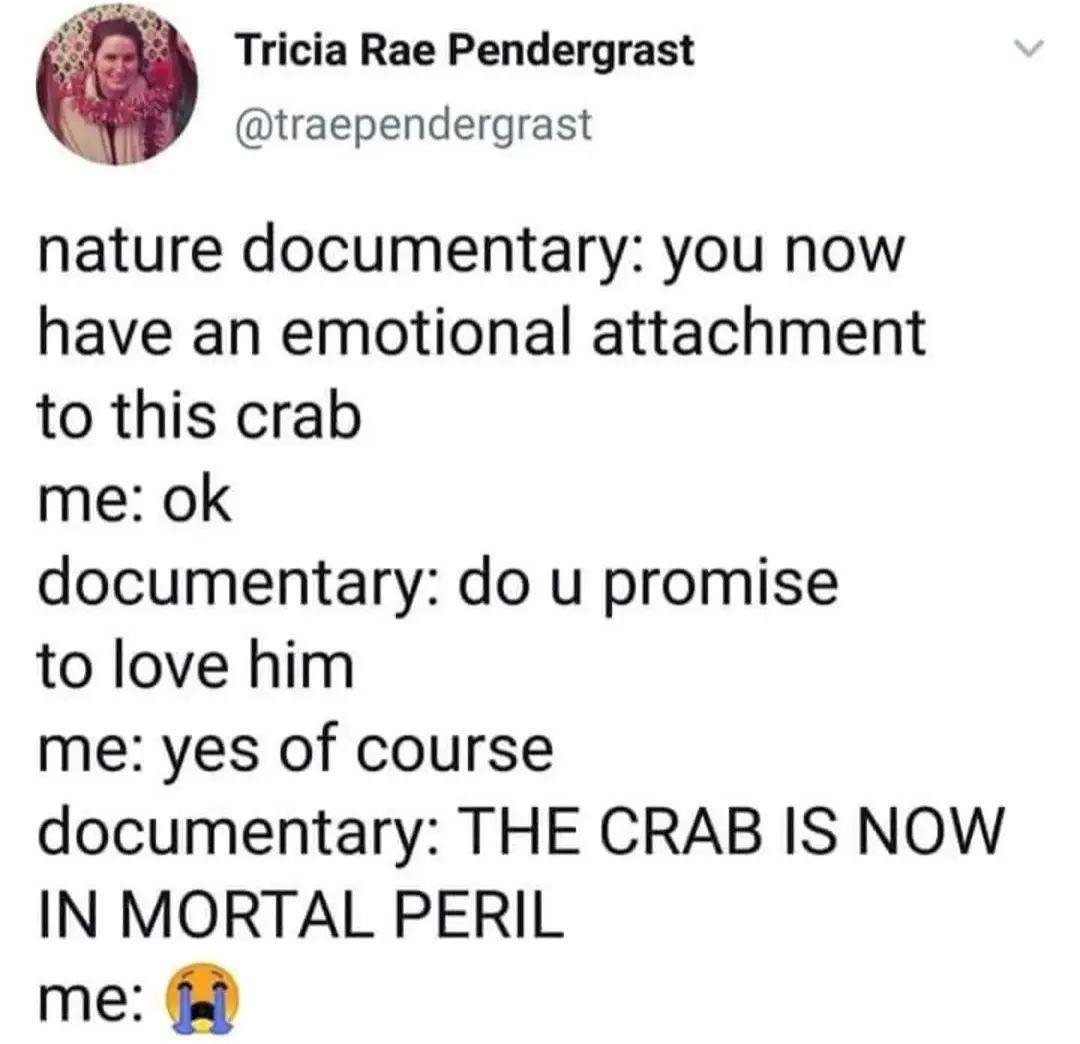this post was submitted on 14 Oct 2024
817 points (99.4% liked)
People Twitter
8058 readers
685 users here now
People tweeting stuff. We allow tweets from anyone.
RULES:
- Mark NSFW content.
- No doxxing people.
- Must be a pic of the tweet or similar. No direct links to the tweet.
- No bullying or international politcs
- Be excellent to each other.
- Provide an archived link to the tweet (or similar) being shown if it's a major figure or a politician.
founded 2 years ago
MODERATORS
you are viewing a single comment's thread
view the rest of the comments
view the rest of the comments

Our camera operator could easily help, but they won't.
Helping the crab would eliminate the purpose of the camera altogether. As humans, we feel empathy for the individual. But in a natural state, there are predators and scavengers who survive if the crab dies, just as the crab preys on its food. The cycle of life will progress undisturbed whether we observe it or not, and learning what we can from the life and death of the crab is more valuable than the sum total of the individual crab's experiences or suffering. Interference will only shift suffering from one individual to the next.
But what do we learn? There's no scientific rigor in dramatizing a creature's survival. The purpose of a nature documentary is to capture on film the essence of the natural world, to share it, but also to sell it for profit. The crab's struggles become the ad dollars that fund the camera crew and studio and the scientific research into crab migration patterns. Of course, the revenue from nature documentaries rarely generates profit to justify the investment. So that can't be the only motivation.
Could it be that anthropomorphizing the crab desensitizes the viewer to accept the suffering of the individual if it benefits the greater good? In this framework, suffering of the individual is expected, even welcome, as long as the system remains strong. Predators eat, prey are eaten, and interference is a fool's errand.
This program is brought to you by Bank of America.
In one of the BBC ones they had this kind of moment with a whole flock of penguins trapped in a gully but then in the post show 'How we filmed all this' part they revealed that after the cameras stopped rolling they just didn't have the heart to let them all die so they cut a set of stairs into the side of the gully so they could get out.
BASED
Well that was a wild ride of a comment.
Your account is overdrawn
there's much more purpose to nature documentaries.
no one would care about any of these animals or there plights without them. zoos and nature documentaries are the biggest drivers or interest and donations in the protecting the natural world.
not interfering with what is happening is more than just a nature documentary thing, it's a journalism thing in general. the only reason journalists get access to the places and things they do is because they don't interfere. interfering with the natural world is a hard thing to do right. usually the obvious answer is the wrong one when it comes to preservation and restoration. and i mean sure, there's times when it's obvious that your interference wouldn't be a bad thing, but part of the point of following a code of ethics is to remove the human element. follow the code strictly and you will never cause harm.
imagine if a bbc earth filmmaker accidentally got an endangered animal in a remote area sick because he decided to remove a fish hook. that remote area would never allow anyone to film there again.
but generally, the goal of journalists is to show things as they are. to educate the world on the problem. to do that you must show the problem playing out without intervention. and if there is no problem, if it's just an animal being hunted then you'd likely be causing harm to something else by preventing it.
a journalist believes they can do more good by showing one child dying to the entire world than by using their talents with words and cameras to somehow save a single starving child. they went there in person to do what they think will be effective in the long term. you could also go there in person to get hands on and save the animals if you want. they are no more guilty of not saving these things than you are.
You could video the dying child and still bring a doctor with you. You can save the individual animals you come across while still filming them first. It's not XOR.
if you save the child people will discredit your story. it's not a story of a child dying if the child doesn't die. you can't capture what is happening if you stop it from happening.
'This child would have died if I didn't stop it, and there are many other children I was unable to save' seems like a perfectly good story to me.
and you are more reasonable than many. many others would deny that people are dying if you can't show them people that have died.